
カール・マルクスの思想
Karl Marx's Thought

☆ カール・マルクスの思想と銘打っているが、本当のところは、カール・マルクスに与えた思想関係の記事である。「カール・マルクス」からのスピンオフである。
| Influences Main article: Influences on Karl Marx Marx's thought demonstrates influence from many sources, including but not limited to: Georg Wilhelm Friedrich Hegel's philosophy[215] The classical political economy (economics) of Adam Smith and David Ricardo,[216] as well as Jean Charles Léonard de Sismondi's critique of laissez-faire economics and analysis of the precarious state of the proletariat[217] French socialist thought,[216] in particular the thought of Jean-Jacques Rousseau, Henri de Saint-Simon, Pierre-Joseph Proudhon and Charles Fourier[218][219] Earlier German philosophical materialism among the Young Hegelians, particularly that of Ludwig Feuerbach and Bruno Bauer,[71] as well as the French materialism of the late 18th century, including Diderot, Claude Adrien Helvétius and d'Holbach Friedrich Engels' analysis of the working class,[67] as well as the early descriptions of class provided by French liberals and Saint-Simonians such as François Guizot and Augustin Thierry Marx's Judaic legacy has been identified as formative to both his moral outlook[220] and his materialist philosophy.[221] Marx's view of history, which came to be called historical materialism (controversially adapted as the philosophy of dialectical materialism by Engels and Lenin), certainly shows the influence of Hegel's claim that one should view reality (and history) dialectically.[215] However, whereas Hegel had thought in idealist terms, putting ideas in the forefront, Marx sought to conceptualise dialectics in materialist terms, arguing for the primacy of matter over idea.[81][215] Where Hegel saw the "spirit" as driving history, Marx saw this as an unnecessary mystification, obscuring the reality of humanity and its physical actions shaping the world.[215] He wrote that Hegelianism stood the movement of reality on its head, and that one needed to set it upon its feet.[215] Despite his dislike of mystical terms, Marx used Gothic language in several of his works: in The Communist Manifesto he proclaims "A spectre is haunting Europe – the spectre of communism. All the powers of old Europe have entered into a holy alliance to exorcise this spectre", and in The Capital he refers to capital as "necromancy that surrounds the products of labour".[222] Though inspired by French socialist and sociological thought,[216] Marx criticised utopian socialists, arguing that their favoured small-scale socialistic communities would be bound to marginalisation and poverty and that only a large-scale change in the economic system could bring about real change.[219][223] Other important contributions to Marx's revision of Hegelianism came from Engels's book, The Condition of the Working Class in England in 1844, which led Marx to conceive of the historical dialectic in terms of class conflict and to see the modern working class as the most progressive force for revolution,[67] as well as from the social democrat Friedrich Wilhelm Schulz, who in Die Bewegung der Produktion described the movement of society as "flowing from the contradiction between the forces of production and the mode of production".[224][225] Marx believed that he could study history and society scientifically, discerning tendencies of history and thereby predicting the outcome of social conflicts. Some followers of Marx, therefore, concluded that a communist revolution would inevitably occur. However, Marx famously asserted in the eleventh of his "Theses on Feuerbach" that "philosophers have only interpreted the world, in various ways; the point however is to change it" and he clearly dedicated himself to trying to alter the world.[6][213] Marx's theories inspired several theories and disciplines of future, including but not limited to: Contemporary critique of political economy Kondratiev wave and Kuznets swing Theory of Underconsumption Creative destruction Crisis theory Quantitative Economic History World-systems theory |
影響 詳細は「カール・マルクスに与えた影響」を参照 マルクスの思想は、以下を含む多くのソースからの影響を示している。 ゲオルク・ヴィルヘルム・フリードリヒ・ヘーゲルの哲学[215] アダム・スミスとデイヴィッド・リカルドの古典派経済学(経済学)[216]、およびジャン・シャルル・レオナール・ド・シスモンディの自由放任経済批判と不安定なプロレタリアートの状態の分析[217] フランスの社会思想、特にジャン=ジャック・ルソー、アンリ・ド・サン=シモン、ピエール=ジョゼフ・プルードン、シャルル・フーリエの思想[218][219] 初期のドイツ観念論的唯物論、特にルートヴィヒ・フォイエルバッハとブルーノ・バウアーのそれ、[71] また、ディドロ、クロード・アドリアン・ヘルヴェティウス、ドルバックなど18世紀後半のフランスの唯物論、 フリードリヒ・エンゲルスの労働者階級の分析、[67] また、フランスの自由主義者やサン=シモニストであるフランソワ・ギゾーやオーギュスタン・ティエリによる階級の初期の記述などがある マルクスのユダヤ教の遺産は、彼の道徳観[220]と唯物論哲学の両方に影響を与えたことが確認されている。 歴史観は、歴史的唯物論(論争の末、エンゲルスとレーニンによって弁証法的唯物論の哲学として修正された)と呼ばれるようになったが、これはヘーゲルの主 張、すなわち現実(と歴史)を弁証法的に見るべきだという主張の影響を受けていることは確かである。 [215] しかし、ヘーゲルが観念論的な観点から考え、観念を前面に押し出していたのに対し、マルクスは唯物論的な観点から弁証法を概念化しようとし、観念よりも物 質が優先されるべきであると主張した。[81][215] ヘーゲルが「精神」が歴史を推進する力であると見ていたのに対し、マルクスはこれを不必要な神秘主義であり、人間性や世界を形成する人間の物理的な行動の 現実を覆い隠すものだと見ていた。 [215] ヘーゲル主義は現実の動きを逆さまにしていると彼は書き、それを正さなければならないと主張した。[215] 神秘的な用語を嫌っていたにもかかわらず、マルクスはいくつかの著作でゴシック調の表現を用いた。『共産党宣言』では「幽霊がヨーロッパを悩ませている。 共産主義という幽霊だ。旧ヨーロッパのすべての権力は、この亡霊を追い払うために神聖同盟を結んだ」と宣言し、『資本論』では資本を「労働の産物を囲い込 む死霊術」と表現している。[222] フランス社会主義や社会学的思想に影響を受けながらも[216]、マルクスはユートピア的社会主義者を批判し、彼らが好む小規模な社会主義共同体は疎外と 貧困に陥る運命にあると主張し、経済システムの大規模な変化のみが真の変化をもたらすことができると論じた[219][223]。 ヘーゲル主義のマルクスによる修正に重要な貢献をしたものとしては、エンゲルスの著書『 1844年のイギリスにおける労働者階級の状況』であり、この本によってマルクスは階級闘争という観点から歴史的弁証法を着想し、近代の労働者階級を革命 の最も進歩的な力とみなすようになった。[67] また、社会民主主義者のフリードリヒ・ヴィルヘルム・シュルツも、著書『生産運動』の中で、社会の運動を「生産力と生産様式の間の矛盾から生じる」ものと して説明している。[224][225] マルクスは、歴史と社会を科学的に研究し、歴史の傾向を見極め、それによって社会的な対立の結果を予測できると考えていた。したがって、マルクスの一部の 信奉者は、共産主義革命が必然的に起こると結論づけた。しかし、マルクスは「フォイエルバッハに関する諸テーゼ」の第11項で、「哲学者たちは世界をさま ざまに解釈してきたにすぎない。しかし、重要なのは世界を変えることである」と述べていることで有名であり、彼は明らかに世界を変えようと努力することに 身を捧げていた。[6][213] マルクスの理論は、以下を含むが、それに限らない、将来のいくつかの理論や学問分野に影響を与えた。 現代の政治経済批判 コンドラチェフ波とクズネッツの揺り戻し 過少消費論 創造的破壊 危機理論 計量経済史 世界システム論 |
| Philosophy and social thought Marx has been called "the first great user of critical method in social sciences", a characterisation stemming from his frequent use of polemics throughout his work to effect critiques of other thinkers.[215][216] He criticised speculative philosophy, equating metaphysics with ideology.[226][227] By adopting this approach, Marx attempted to separate key findings from ideological biases.[216] This set him apart from many contemporary philosophers.[6] |
哲学と社会思想 マルクスは「社会科学における批判的方法の最初の偉大な使用者」と呼ばれており、これは彼の著作全体を通じて他の思想家の批判を行うために弁証法を頻繁に 使用していたことに由来する。[215][216] 彼は思弁哲学を批判し、形而上学をイデオロギーと同一視した。[226][227] このアプローチを採用することで、マルクスは主要な発見をイデオロギー的偏見から切り離そうとした。 。この点で彼は多くの同時代の哲学者たちとは異なっていた。[6] |
| Human nature Further information: Marx's theory of human nature 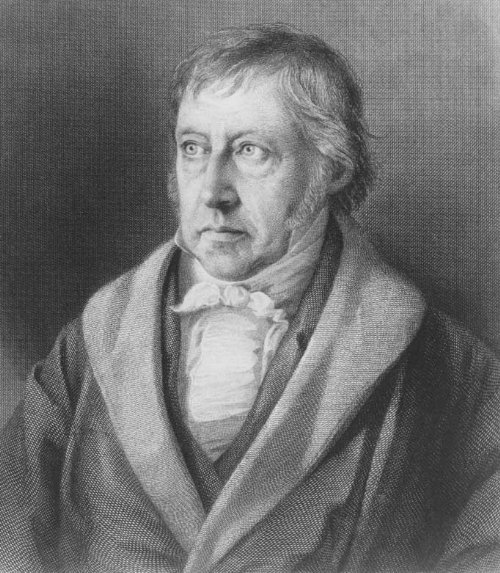 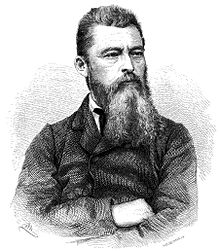 The philosophers G.W.F. Hegel (left) and Ludwig Feuerbach, whose ideas on dialectics heavily influenced Marx Like Tocqueville, who described a faceless and bureaucratic despotism with no identifiable despot,[228] Marx also broke with classical thinkers who spoke of a single tyrant and with Montesquieu, who discussed the nature of the single despot. Instead, Marx set out to analyse "the despotism of capital".[229] Fundamentally, Marx assumed that human history involves transforming human nature, which encompasses both human beings and material objects.[230] Humans recognise that they possess both actual and potential selves.[231][232] For both Marx and Hegel, self-development begins with an experience of internal alienation stemming from this recognition, followed by a realisation that the actual self, as a subjective agent, renders its potential counterpart an object to be apprehended.[232] Marx further argues that by moulding nature[233] in desired ways[234] the subject takes the object as its own and thus permits the individual to be actualised as fully human. For Marx, the human nature – Gattungswesen, or species-being – exists as a function of human labour.[231][232][234] Fundamental to Marx's idea of meaningful labour is the proposition that for a subject to come to terms with its alienated object it must first exert influence upon literal, material objects in the subject's world.[235] Marx acknowledges that Hegel "grasps the nature of work and comprehends objective man, authentic because actual, as the result of his own work",[236] but characterises Hegelian self-development as unduly "spiritual" and abstract.[237] Marx thus departs from Hegel by insisting that "the fact that man is a corporeal, actual, sentient, objective being with natural capacities means that he has actual, sensuous objects for his nature as objects of his life-expression, or that he can only express his life in actual sensuous objects".[235] Consequently, Marx revises Hegelian "work" into material "labour" and in the context of human capacity to transform nature the term "labour power".[81] |
人間の本性 さらに詳しい情報:マルクスの人間性理論   ヘーゲル(左)とルートヴィヒ・フォイエルバッハの弁証法理論は、マルクスに大きな影響を与えた トクヴィルと同様に、マルクスも、特定の専制者を伴わない、顔のない官僚的専制政治について述べた古典思想家たちや、単独の専制者の本質について論じたモ ンテスキューとは一線を画した。その代わりに、マルクスは「資本の専制」の分析に着手した。[229] 基本的に、マルクスは、人間史には人間性(人間と物質の両方を包含する)の変容が関わっていると想定した。[230] 人間は、現実の自己と潜在的な自己の両方を所有していることを認識している。[231][232] マルクスとヘーゲルにとって、自己発展は、この認識に起因する内的疎外の経験から始まり、それに続いて、主観的な主体としての実際の自己が、潜在的な自己 を把握すべき対象として認識するという段階を踏む。[232] マルクスはさらに、自然を望ましい方法で形作ることによって[233]、主体が対象を自己のものとし、それによって個人が完全に人間として実現されること を可能にする、と論じている。マルクスにとって、人間の本性、すなわち種本性(Gattungswesen)は、人間の労働の機能として存在する。 [231][232][234] マルクスの有意義な労働の概念の根底にあるのは、主体が疎外された対象と折り合いをつけるためには、まず主体の世界にある文字通りの物質的な対象に影響を 及ぼさなければならないという命題である。 [235] マルクスはヘーゲルが「労働の本質を把握し、自身の労働の結果として、本物であるがゆえに真の客観的な人間を理解している」ことを認めているが、 [236] ヘーゲル的な自己発展を過度に「精神的な」抽象的なものと特徴づけている。[237] マルクスはヘーゲルとは異なり、「人間が肉体を持ち、現実的で、感覚的で、客観的な存在であり、自然の能力を備えているという事実は、彼が人生の表現の対 象として、現実的で感覚的な対象を本質として持つ、あるいは、現実的で感覚的な対象においてのみ、自分の人生を表現できることを意味する」と主張してい る。 [235] したがって、マルクスはヘーゲル的な「労働」を物質的な「労働」に修正し、人間が自然を変換する能力という文脈では「労働力」という用語を使用している。 [81] |
| Labour, class struggle and false consciousness Further information: Alienation (Marxism), Class struggle, and Capitalist mode of production (Marxist theory) The history of all hitherto existing society is the history of class struggles. — Karl Marx, The Communist Manifesto[238] 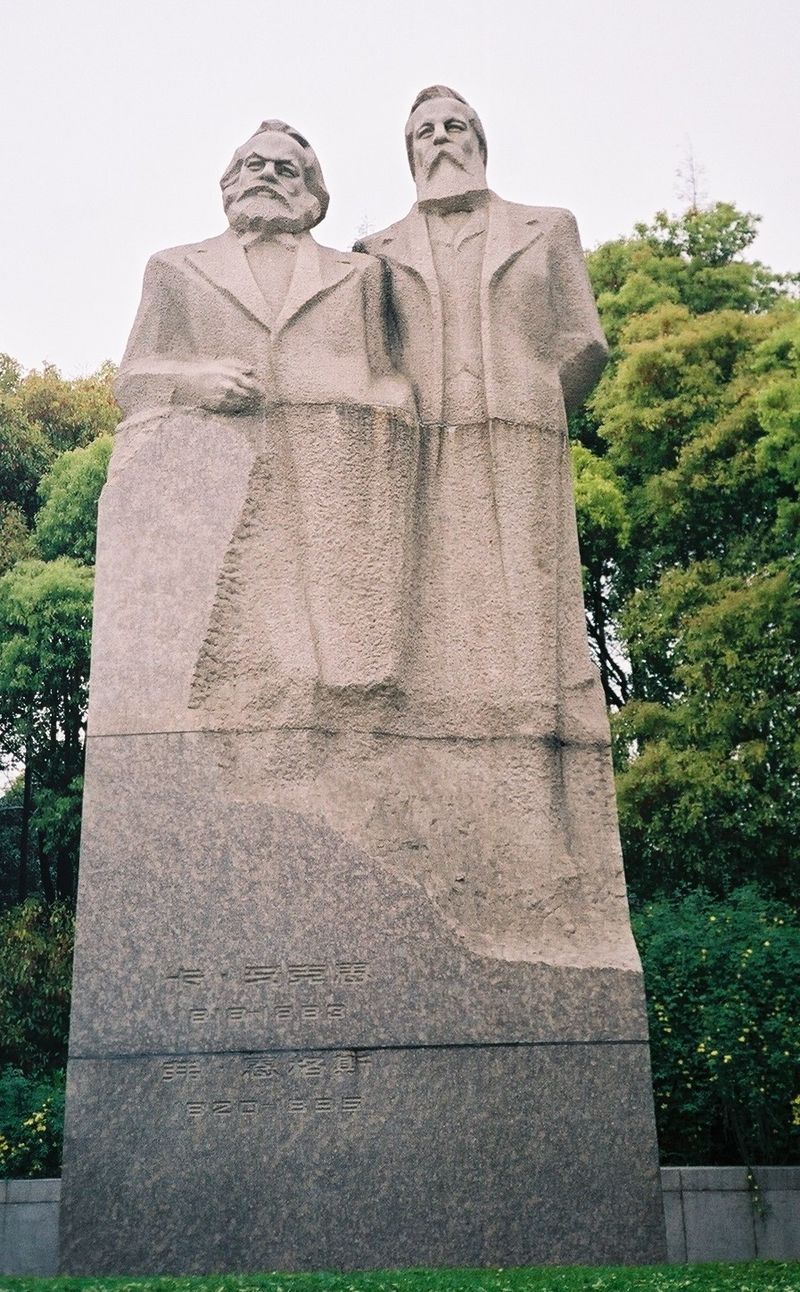 A monument dedicated to Marx and Engels in Shanghai, China Marx had a special concern with how people relate to their own labour power.[239] He wrote extensively about this in terms of the problem of alienation.[240] As with the dialectic, Marx began with a Hegelian notion of alienation but developed a more materialist conception.[239] Capitalism mediates social relationships of production (such as among workers or between workers and capitalists) through commodities, including labour, that are bought and sold on the market.[239] For Marx, the possibility that one may give up ownership of one's own labour – one's capacity to transform the world – is tantamount to being alienated from one's own nature and it is a spiritual loss.[239] Marx described this loss as commodity fetishism, in which the things that people produce, commodities, appear to have a life and movement of their own to which humans and their behaviour merely adapt.[241] Commodity fetishism provides an example of what Engels called "false consciousness",[242] which relates closely to the understanding of ideology. By "ideology", Marx and Engels meant ideas that reflect the interests of a particular class at a particular time in history, but which contemporaries see as universal and eternal.[243] Marx and Engels's point was not only that such beliefs are at best half-truths, as they serve an important political function. Put another way, the control that one class exercises over the means of production include not only the production of food or manufactured goods but also the production of ideas (this provides one possible explanation for why members of a subordinate class may hold ideas contrary to their own interests).[81][244] Marx was an outspoken opponent of child labour,[245] saying that British industries "could but live by sucking blood, and children's blood too", and that U.S. capital was financed by the "capitalized blood of children".[222][246] |
労働、階級闘争、偽りの意識 さらに詳しい情報:疎外(マルクス主義)、階級闘争、資本主義的生産様式(マルクス主義理論 これまでのあらゆる社会の歴史は階級闘争の歴史である。 — カール・マルクス、『共産党宣言』[238]  中国・上海にあるマルクスとエンゲルスを記念するモニュメント マルクスは、人々が自身の労働力とどのように関わるかということに特別な関心を抱いていた。[239] 彼は疎外の問題として、このことについて広範にわたって記述している。[240] 弁証法と同様に、マルクスはヘーゲル的な疎外の概念から出発したが、より唯物論的な概念を発展させた。 [239] 資本主義は、労働力を含む商品(市場で売買される)を通じて、生産における社会的関係(労働者間や労働者と資本家間など)を仲介する。[239] マルクスにとって、労働力(世界を変容させる能力)の所有権を放棄する可能性は、自身の自然から疎外されることに等しく、精神的な損失である。 [239] マルクスは、この喪失を「商品崇拝」と表現した。商品崇拝においては、人々が生産する商品が、あたかもそれ自体で生命と運動を持っているかのように見え、 人間とその行動は、その商品に適応しているだけである。 商品崇拝は、エンゲルスが「偽りの意識」と呼んだものの例であり、[242] それはイデオロギーの理解と密接に関連している。「イデオロギー」という言葉で、マルクスとエンゲルスが意味していたのは、歴史の特定の時代における特定 の階級の利益を反省的に表現した思想であるが、同時代の人々には普遍的かつ永遠なものとして映るというものである。[243] マルクスとエンゲルスの主張は、そのような信念はせいぜい半真理にすぎず、重要な政治的機能を果たしているというものであった。別の言い方をすれば、ある 階級が生産手段に対して行使する支配には、食料や製造品の生産だけでなく、思想の生産も含まれる(これは、従属階級の構成員が自分たちの利益に反する思想 を抱く理由の説明のひとつとなる)。[81][244] マルクスは児童労働の公然たる反対者であり、[245] イギリスの産業は「血を吸うことでしか生きられない。子どもの血も吸う」と述べ、アメリカの資本は「子どもたちの血を資本化したもの」によって賄われていると主張した。[222][246] |
| Religion Marx agreed with Feuerbach that religion is a human construct reflecting human conditions ("man creates religion, religion does not create man"), but analysed this in historical, not abstract terms. He saw religion as both an expression of suffering and a protest against it. In his 1843 essay Critique of Hegel's Philosophy of Right, Marx sought to distance himself from Young Hegelians like Bruno Bauer, whose religion-focused critique, in his view, could not be a solution to human suffering without a transformative critique of society. Critique of religion would be ineffective without changing the real social conditions of which religion is only an expression.[247] According to Shlomo Avineri, the famous passage from the introduction to this essay is, though often only partially quoted, "both more complex and more profound" than would seem, and Marx here expressed "empathy, not scorn" for religious feelings:[247] Religious suffering is, at one and the same time, the expression of real suffering and a protest against real suffering. Religion is the sigh of the oppressed creature, the heart of a heartless world, and the soul of soulless conditions. It is the opium of the people. The abolition of religion as the illusory happiness of the people is the demand for their real happiness. To call on them to give up their illusions about their condition is to call on them to give up a condition that requires illusions.[248] Similar to the later views of Max Weber, Marx believed that religion plays a legitimating function for the dominant classes by providing a divine sanction for inequality and existing social conditions, and that for subordinate classes religion offers an escape:[249] like an opiate, alleviating pain but not offering a cure.[247] Marx's gymnasium senior thesis at the Gymnasium zu Trier [de] argued that religion had as its primary social aim the promotion of solidarity.[citation needed] |
宗教 マルクスは、宗教は人間の状況を反映した人間の構築物であるというフォイエルバッハの意見に同意したが(「人間が宗教を作り、宗教が人間を作るのではな い」)、これを抽象的な言葉ではなく歴史的な言葉で分析した。彼は、宗教を苦悩の表現であり、苦悩に対する抗議であると捉えた。1843年の論文『ヘーゲ ル法哲学批判』において、マルクスはブルーノ・バウアーのようなヘーゲル主義青年派と距離を置こうとした。マルクスの考えでは、宗教に焦点を当てた彼らの 批判は、社会の変革的な批判なしには人間の苦悩に対する解決策とはなり得ない。宗教批判は、宗教が表現にすぎない現実の社会状況を変えることなくしては効 果がない。 シャローム・アヴィネリによると、この論文の序文からの有名な一節は、部分的にしか引用されないことが多いが、一見したよりも「より複雑でより深遠」であり、マルクスはここで宗教的感情に対して「共感、侮蔑ではない」気持ちを表明しているという。[247] 宗教的な苦悩は、同時に、現実の苦悩の表現であり、現実の苦悩に対する抗議である。宗教は、虐げられた生き物のため息であり、無情な世界の心の叫びであり、魂なき状況の魂である。それは民衆にとってアヘンである。 民衆の幻想的な幸福としての宗教の廃止は、彼らの真の幸福の要求である。彼らの状況に対する幻想を捨てるよう呼びかけることは、幻想を必要とする状況を捨てるよう呼びかけることである。[248] マックス・ヴェーバーの後の見解と同様に、マルクスは、宗教が不平等や既存の社会状況に対して神聖な承認を与えることで支配階級に正当性を与える機能を持 つと信じていた。また、従属階級にとっては、宗教は逃避の手段であるとも考えていた。[249] 鎮痛剤のように、痛みを和らげることはできても、治療にはならない。[247] マルクスのトリアー体育学校での卒業論文では、宗教の主な社会的目標は連帯の促進であると主張している。 [要出典] |
| Critique of political economy, history and society Further information: Critique of political economy and Marxian economics But you Communists would introduce community of women, screams the whole bourgeoisie in chorus. The bourgeois sees in his wife a mere instrument of production. He hears that the means of production are to be exploited in common, and, naturally, can come to no other conclusion than that the lot of being common to all will likewise fall to the women. He has not even a suspicion that the real point aimed at is to do away with the status of women as mere mean of production. —Karl Marx, The Communist Manifesto[250] Marx's thoughts on labour and its function in reproducing capital were related to the primacy he gave to social relations in determining the society's past, present and future.[215][251][252] Critics have called this economic determinism. Labour is the precondition for the existence of, and accumulation of capital, which both shape the social system.[252] For Marx, social change was driven by conflict between opposing interests, by parties situated in the historical situation of their mode of production.[176] This became the inspiration for the body of works known as the conflict theory.[251] In his evolutionary model of history, he argued that human history began with free, productive and creative activities that was over time coerced and dehumanised, a trend most apparent under capitalism.[215] Marx noted that this was not an intentional process, but rather due to the immanent logic of the current mode of production which demands more human labour (abstract labour) to reproduce the social relationships of capital.[175][177] The organisation of society depends on means of production. The means of production are all things required to produce material goods, such as land, natural resources, and technology but not human labour. The relations of production are the social relationships people enter into as they acquire and use the means of production.[251] Together, these compose the mode of production and Marx distinguished historical eras in terms of modes of production. Marx differentiated between base and superstructure, where the base (or substructure) is the economic system and superstructure is the cultural and political system.[251] Marx regarded this mismatch between economic base and social superstructure as a major source of social conflict.[251] Despite Marx's stress on the critique of capitalism and discussion of the new communist society that should replace it, his explicit critique is guarded, as he saw it as an improved society compared to the past ones (slavery and feudalism).[81] Marx never clearly discusses issues of morality and justice, but scholars agree that his work contained implicit discussion of those concepts.[81] 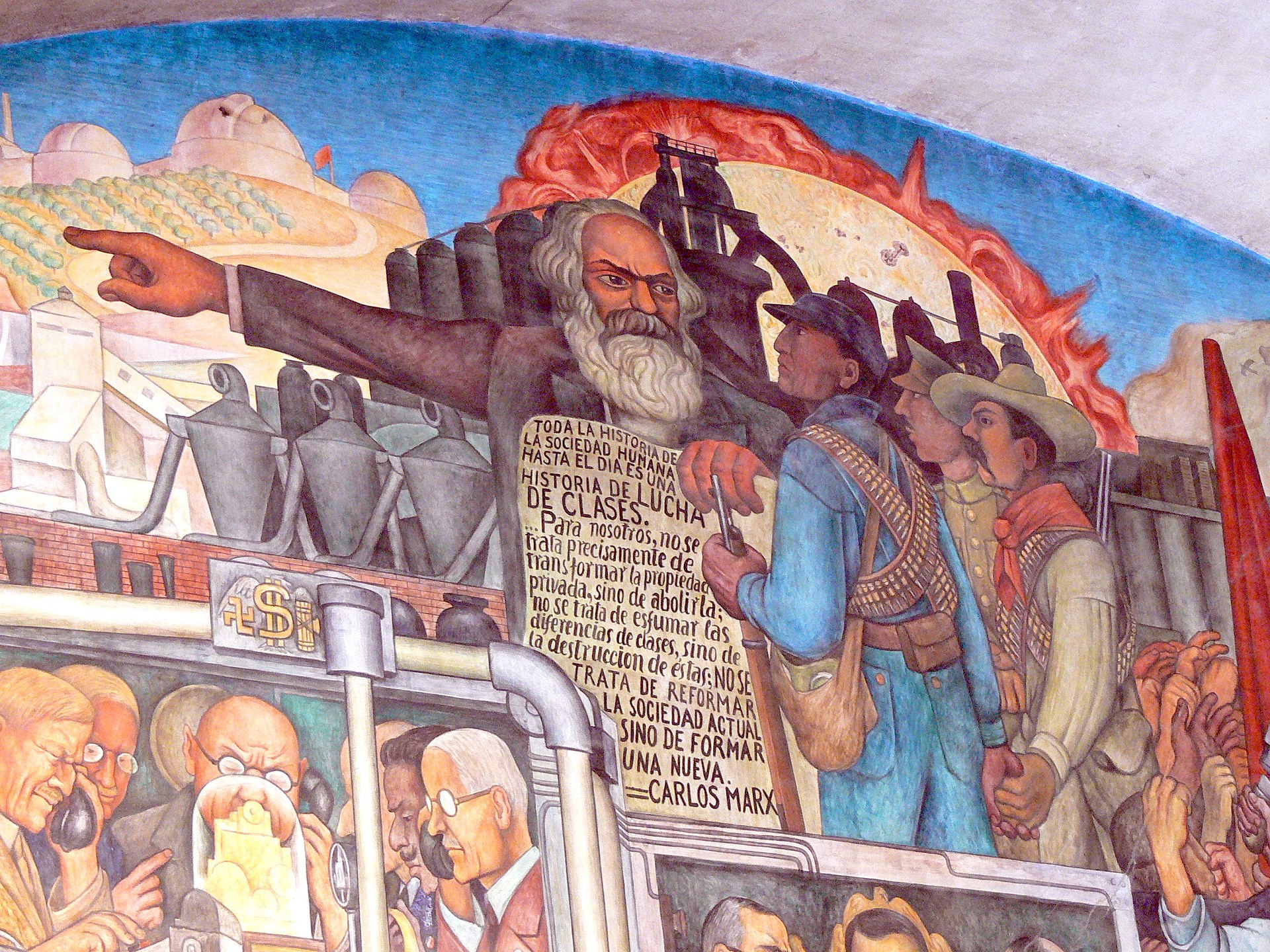 A mural by Diego Rivera showing Karl Marx, in the National Palace in Mexico City Marx's view of capitalism was two-sided.[81][152] On one hand, in the 19th century's deepest critique of the dehumanising aspects of this system he noted that defining features of capitalism include alienation, exploitation and recurring, cyclical depressions leading to mass unemployment. On the other hand, he characterised capitalism as "revolutionising, industrialising and universalising qualities of development, growth and progressivity" (by which Marx meant industrialisation, urbanisation, technological progress, increased productivity and growth, rationality, and scientific revolution) that are responsible for progress, at in contrast to earlier forms of societies.[81][152][215] Marx considered the capitalist class to be one of the most revolutionary in history because it constantly improved the means of production, more so than any other class in history and was responsible for the overthrow of feudalism.[219][253] Capitalism can stimulate considerable growth because the capitalist has an incentive to reinvest profits in new technologies and capital equipment.[239] According to Marx, capitalists take advantage of the difference between the labour market and the market for whatever commodity the capitalist can produce. Marx observed that in practically every successful industry, input unit-costs are lower than output unit-prices. Marx called the difference "surplus value" and argued that it was based on surplus labour, the difference between what it costs to keep workers alive, and what they can produce.[81] Although Marx describes capitalists as vampires sucking worker's blood,[215] he notes that drawing profit is "by no means an injustice" since Marx, according to Allen W. Wood "excludes any trans-epochal standpoint from which one can comment" on the morals of such particular arrangements.[81] Marx also noted that even the capitalists themselves cannot go against the system.[219] The problem is the "cancerous cell" of capital, understood not as property or equipment, but the social relations between workers and owners, (the selling and purchasing of labour power) – the societal system, or rather mode of production, in general.[219] At the same time, Marx stressed that capitalism was unstable and prone to periodic crises.[95] He suggested that over time capitalists would invest more and more in new technologies and less and less in labour.[81] Since Marx believed that profit derived from surplus value appropriated from labour, he concluded that the rate of profit would fall as the economy grows.[254] Marx believed that increasingly severe crises would punctuate this cycle of growth and collapse.[254] Moreover, he believed that in the long-term, this process would enrich and empower the capitalist class and impoverish the proletariat.[254][219] In section one of The Communist Manifesto, Marx describes feudalism, capitalism, and the role internal social contradictions play in the historical process: We see then: the means of production and of exchange, on whose foundation the bourgeoisie built itself up, were generated in feudal society. At a certain stage in the development of these means of production and of exchange, the conditions under which feudal society produced and exchanged ... the feudal relations of property became no longer compatible with the already developed productive forces; they became so many fetters. They had to be burst asunder; they were burst asunder. Into their place stepped free competition, accompanied by a social and political constitution adapted in it, and the economic and political sway of the bourgeois class. A similar movement is going on before our own eyes ... The productive forces at the disposal of society no longer tend to further the development of the conditions of bourgeois property; on the contrary, they have become too powerful for these conditions, by which they are fettered, and so soon as they overcome these fetters, they bring order into the whole of bourgeois society, endanger the existence of bourgeois property.[4] 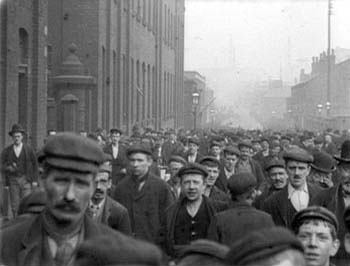 Outside a factory in Oldham, 1900. Marx believed that industrial workers, the proletariat, would rise up around the world. |
政治経済、歴史、社会の批判 詳細情報:政治経済批判とマルクス経済学 しかし、共産主義者たちは女性共同体を導入するだろう、とブルジョワジー全体が合唱して叫んでいる。ブルジョワは、妻を単なる生産手段と見なしている。生 産手段が共同で利用されると聞き、当然ながら、すべてに共通するものが女性にも当てはまるという結論に達する。彼は、真の狙いは女性を単なる生産手段とし て扱う状態をなくすことにあるという疑いさえ持っていない。 —カール・マルクス、『共産党宣言』[250] 労働と資本再生産の機能に関するマルクスの考えは、社会の過去、現在、未来を決定する上で彼が重視した社会的関係と関連している。[215][251] [252] 批評家たちはこれを経済決定論と呼んでいる。労働は資本の存在と蓄積の前提であり、両者が社会システムを形成する。[252] マルクスにとって、社会変化は対立する利害関係者間の対立によって引き起こされ、生産様式の歴史的状況に置かれた当事者によって引き起こされる。 [176] これが、対立理論として知られる一連の著作の着想となった。[251] 歴史の進化モデルにおいて、彼は、人間の歴史は自由で生産的かつ創造的な活動から始まったが、やがて強制と非人間化が伴うようになったと主張した。この傾 向は資本主義下で最も顕著である。[215] マルクスは、これは意図的なプロセスではなく、資本の社会的関係を再生産するために、より多くの人的労働(抽象労働)を必要とする現在の生産様式の内在的 論理によるものだと指摘した。[175][177] 社会の組織は生産手段に依存する。生産手段とは、土地や天然資源、技術など、物質的な財を生産するために必要なあらゆるものを指し、人間の労働力は含まれ ない。生産関係とは、生産手段を獲得し利用する際に人々が結ぶ社会的関係である。[251] これらを総合して生産様式が構成され、マルクスは生産様式の観点から歴史的時代を区別した。マルクスは基盤と上部構造を区別し、基盤(または下部構造)は 経済体制であり、上部構造は文化および政治体制であるとした。[251] マルクスは、経済基盤と社会上部構造のこの不整合を、社会紛争の主な原因であるとみなした。[251] マルクスは資本主義の批判とそれに取って代わるべき新しい共産主義社会についての議論を強調していたが、彼の明示的な批判は控えめなものであり、それは彼 が過去の社会(奴隷制や封建制)と比較して改善された社会と捉えていたためである。[81] マルクスは道徳や正義の問題を明確に論じたことはなかったが、彼の著作にはそれらの概念が暗に論じられているという点では学者たちの意見は一致している。 [81]  メキシコシティの国立宮殿にある、カール・マルクスを描いたディエゴ・リベラの壁画 マルクスの資本主義観は二面性があった。[81][152] 一方では、19世紀におけるこのシステムの非人間的側面に対する最も深い批判の中で、マルクスは資本主義の特徴として、疎外、搾取、そして大量失業につな がる周期的な恐慌の繰り返しを挙げている。一方で、彼は資本主義を「発展、成長、進歩の革命的、産業的、普遍的な性質」(マルクスが意味するものは、産業 化、都市化、技術的進歩、生産性と成長の向上、合理性、科学的革命)として特徴づけ、それらは以前の社会形態とは対照的に、進歩の要因であるとした。 [81][152][215] マルクスは資本家階級を歴史上最も革命的なもののひとつと考えた。なぜなら、資本家階級は生産手段を絶えず改善し、歴史上のどの階級よりもその傾向が強 く、封建制の打倒に責任があったからである。[219][253] 資本主義は、資本家が利益を新技術や資本設備に再投資するインセンティブを持つため、著しい成長を促すことができる。[239] マルクスによれば、資本家は労働市場と、資本家が生産可能なあらゆる商品の市場との間の差異を利用する。マルクスは、事実上あらゆる成功した産業におい て、投入単位費用は生産単位価格よりも低いことを観察した。マルクスは、この差異を「剰余価値」と呼び、それは剰余労働、つまり労働者の生活維持に必要な 費用と労働者が生産可能なものの差額に基づくと主張した。 [81] マルクスは資本家を労働者の血を吸う吸血鬼と表現しているが[215]、アレン・W・ウッドによると、マルクスは「そのような個別的な取り決めについての 道徳を論じるような時代を超えた立場を一切排除している」ため、利益を得ることは「決して不正義ではない」と指摘している。[81] マルクスはまた、資本家自身でさえもそのシステムに逆らうことはできないと指摘している。 [219] 問題は資本の「癌細胞」であり、それは財産や設備ではなく、労働者と所有者の間の社会的関係(労働力の売買)であり、すなわち社会システム、あるいは生産 様式全般であると理解されている。 同時に、マルクスは資本主義は不安定であり、周期的な危機に陥りやすいと強調した。[95] 彼は、資本家は時が経つにつれ、新技術への投資をますます増やし、労働への投資をますます減らしていくと示唆した。[81] マルクスは、利益は労働から奪い取った剰余価値から得られると信じていたため、経済が成長するにつれ、利潤率は低下すると結論付けた。[254] マルクスは、この成長と崩壊のサイクルは、ますます深刻な危機によって中断されると信じていた。 [254] さらに、長期的にはこのプロセスが資本家階級を富ませ、権力を与え、プロレタリアートを貧困化させるだろうと信じていた。[254][219] 『共産党宣言』の第1章で、マルクスは封建制、資本主義、そして歴史的プロセスにおける社会内部の矛盾の役割について次のように述べている。 すなわち、生産手段と交換手段、すなわちブルジョワジーが自らを築き上げた基盤となるものは、封建社会において生み出された。生産手段と交換手段の発展の 一定の段階において、封建社会が生産し交換していた条件、すなわち封建的な財産関係は、すでに発展した生産力と両立し得なくなった。それらは多くの足かせ となった。それらは打ち破られなければならなかった。そして、打ち破られた。その代わりに、それに適応した社会・政治体制とブルジョワ階級の経済・政治的 影響力を伴った自由競争が台頭した。同様の動きが我々の目の前でも進行している。社会が利用可能な生産力は、もはやブルジョワ所有の条件をさらに発展させ る傾向にはない。それどころか、それらはそれらを束縛する条件に対して強力になりすぎ、それらの束縛を克服するやいなや、ブルジョワ社会全体に秩序をもた らし、ブルジョワ所有の存在を脅かすようになった。  1900年、オールドハムの工場外。マルクスは、産業労働者であるプロレタリアートが世界中で蜂起すると信じていた。 1900年、オールドハムの工場外。マルクスは、産業労働者であるプロレタリアートが世界中で蜂起すると信じていた。 |
| Marx
believed that those structural contradictions within capitalism
necessitate its end, giving way to socialism, or a post-capitalistic,
communist society: The development of modern industry, therefore, cuts from under its feet the very foundation on which the bourgeoisie produces and appropriates products. What the bourgeoisie, therefore, produces, above all, are its own grave-diggers. Its fall and the victory of the proletariat are equally inevitable.[4] Thanks to various processes overseen by capitalism, such as urbanisation, the working class, the proletariat, should grow in numbers and develop class consciousness, in time realising that they can and must change the system.[215] Marx believed that if the proletariat were to seize the means of production, they would encourage social relations that would benefit everyone equally, abolishing the exploiting class and introducing a system of production less vulnerable to cyclical crises.[215] Marx argued in The German Ideology that capitalism will end through the organised actions of an international working class: Communism is for us not a state of affairs which is to be established, an ideal to which reality will have to adjust itself. We call communism the real movement which abolishes the present state of things. The conditions of this movement result from the premises now in existence.[255] In this new society, the alienation would end and humans would be free to act without being bound by selling their labour.[254] It would be a democratic society, enfranchising the entire population.[219] In such a utopian world, there would also be little need for a state, whose goal was previously to enforce the alienation.[254] Marx theorised that between capitalism and the establishment of a socialist/communist system, would exist a period of dictatorship of the proletariat – where the working class holds political power and forcibly socialises the means of production.[219] As he wrote in his Critique of the Gotha Program, "between capitalist and communist society there lies the period of the revolutionary transformation of the one into the other. Corresponding to this is also a political transition period in which the state can be nothing but the revolutionary dictatorship of the proletariat".[256] While he allowed for the possibility of peaceful transition in some countries with strong democratic institutional structures (such as Britain, the United States, and the Netherlands), he suggested that in other countries in which workers cannot "attain their goal by peaceful means" the "lever of our revolution must be force".[257] |
マルクスは、資本主義の内部に存在する構造的な矛盾が、資本主義の終焉を必然化し、社会主義、あるいは資本主義後の共産主義的社会への道を開くと考えていた。 「したがって、近代産業の発展は、ブルジョワジーが生産し、製品を所有する基盤をその足元から切り崩す。したがって、ブルジョワジーが生産するものは、何 よりもまず、彼ら自身の墓掘り人である。ブルジョワジーの没落とプロレタリアートの勝利は、同様に避けられない。」[4] 資本主義が監督するさまざまなプロセス、例えば都市化のおかげで、労働者階級であるプロレタリアートは数を増やし、階級意識を発展させ、やがては体制を変 えることができるし、変えなければならないと気づくはずである。[215] マルクスは、プロレタリアートが生産手段を掌握すれば、搾取階級を廃止し、周期的な危機に影響されにくい生産体制を導入することで、万人に等しく利益をも たらす社会関係を促進できると信じていた。 [215] マルクスは『ドイツ・イデオロギー』の中で、資本主義は国際労働者階級の組織的な行動によって終焉を迎えると論じている。 共産主義は、我々にとって、確立されるべき状態、現実がそれに適応しなければならない理想などではない。我々は、共産主義を、現在の状態を廃止する現実的な運動と呼ぶ。この運動の条件は、現在存在する前提条件から生じる。[255] この新しい社会では、疎外は終わり、労働力を売ることに縛られることなく、人間は自由に振る舞うことができるだろう。[254] それは民主的社会であり、全住民に参政権を与えるだろう。[219] このようなユートピア的世界では、疎外を強制することを目的としていた国家の必要性もほとんどなくなるだろう。 [254] マルクスは、資本主義と社会主義/共産主義体制の確立の間に、プロレタリア独裁の時代が存在すると理論化した。プロレタリア独裁とは、労働者階級が政治権 力を握り、生産手段を強制的に社会化する時代である。[219] 彼は『ゴータ・プログラム批判』の中で、「資本主義社会と共産主義社会の間には、一方から他方への革命的変革の期間が存在する。これに対応するものとし て、国家がプロレタリアートの革命的独裁以外の何者でもない政治的過渡期もある」[256]。彼は、強固な民主的制度的構造を持つ一部の国々(イギリス、 アメリカ、オランダなど)では平和的な移行の可能性を認めたが、労働者が「平和的手段によって目的を達成」できない他の国々では、「革命のてこは力でなけ ればならない」と示唆した。[257] |
International relations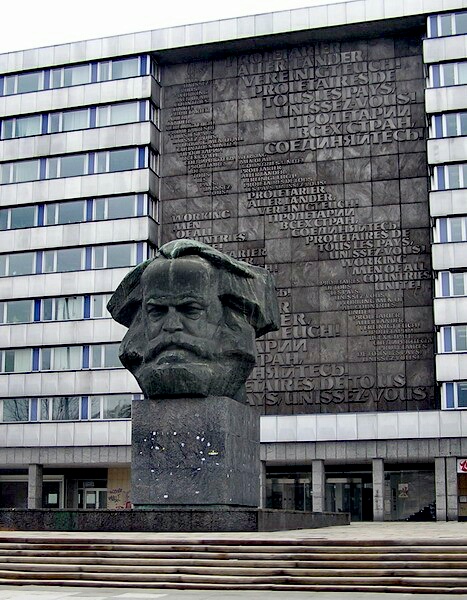 Karl Marx Monument in Chemnitz, known as Karl-Marx-Stadt from 1953 to 1990 Marx viewed Russia as the main counter-revolutionary threat to European revolutions.[258] During the Crimean War, Marx backed the Ottoman Empire and its allies Britain and France against Russia.[258] He was absolutely opposed to Pan-Slavism, viewing it as an instrument of Russian foreign policy.[258] Marx had considered the Slavic nations except Poles as 'counter-revolutionary'. Marx and Engels published in the Neue Rheinische Zeitung in February 1849: To the sentimental phrases about brotherhood which we are being offered here on behalf of the most counter-revolutionary nations of Europe, we reply that hatred of Russians was and still is the primary revolutionary passion among Germans; that since the revolution [of 1848] hatred of Czechs and Croats has been added, and that only by the most determined use of terror against these Slav peoples can we, jointly with the Poles and Magyars, safeguard the revolution. We know where the enemies of the revolution are concentrated, viz. in Russia and the Slav regions of Austria, and no fine phrases, no allusions to an undefined democratic future for these countries can deter us from treating our enemies as enemies. Then there will be a struggle, an "inexorable life-and-death struggle", against those Slavs who betray the revolution; an annihilating fight and ruthless terror – not in the interests of Germany, but in the interests of the revolution!"[259] Marx and Engels sympathised with the Narodnik revolutionaries of the 1860s and 1870s. When the Russian revolutionaries assassinated Tsar Alexander II of Russia, Marx expressed the hope that the assassination foreshadowed 'the formation of a Russian commune'.[260] Marx supported the Polish uprisings against tsarist Russia.[258] He said in a speech in London in 1867: In the first place the policy of Russia is changeless... Its methods, its tactics, its manoeuvres may change, but the polar star of its policy – world domination – is a fixed star. In our times only a civilised government ruling over barbarian masses can hatch out such a plan and execute it. ... There is but one alternative for Europe. Either Asiatic barbarism, under Muscovite direction, will burst around its head like an avalanche, or else it must re-establish Poland, thus putting twenty million heroes between itself and Asia and gaining a breathing spell for the accomplishment of its social regeneration.[261] |
国際関係 カール・マルクス記念碑(ケムニッツ)は、1953年から1990年までカール・マルクス・シュタットとして知られていた マルクスは、ヨーロッパ革命に対する主な反革命的脅威としてロシアを捉えていた。[258] クリミア戦争中、マルクスはロシアに対してオスマン帝国とその同盟国であるイギリスとフランスを支援した。[258] 彼は汎スラヴ主義に強く反対しており、それをロシアの外交政策の道具とみなしていた。[258] マルクスは、ポーランド人を除くスラブ民族を「反革命的」と考えていた。マルクスとエンゲルスは1849年2月、ノイエ・ライン新聞に次のように発表し た。 ヨーロッパで最も反革命的な国民を代表してここで提示されている同胞愛に関する感傷的な表現に対して、我々は、ドイツ人にとってロシア人への憎悪は今も昔 も革命の原動力であると答える。1848年の革命以来、チェコ人とクロアチア人への憎悪が加わった。そして、これらのスラブ民族に対して断固としたテロを 行うことによってのみ、ポーランド人やマジャル人とともに革命を守ることができるのだ。我々は革命の敵がどこに集中しているかを知っている。すなわち、ロ シアとオーストリアのスラブ地域である。これらの国々に対する美辞麗句や、曖昧な民主的未来への言及は、敵を敵として扱うことを妨げることはできない。そ して、革命を裏切るスラブ人たちとの「容赦ない生死をかけた闘争」が繰り広げられるだろう。それは、ドイツのためではなく、革命のための、徹底的な戦いで あり、冷酷なテロである![259] マルクスとエンゲルスは、1860年代と1870年代のナロードニキ革命派に共感していた。ロシア革命派がロシア皇帝アレクサンドル2世を暗殺した際、マ ルクスは「ロシアのコミューンの形成」を予兆するものだと期待を表明した。[260] マルクスは、ロシア皇帝に対するポーランドの蜂起を支援した。[258] 1867年にロンドンで行った演説で、マルクスは次のように述べた。 そもそもロシアの政策は不変である... その手法、戦術、作戦は変化しても、その政策の北極星である世界支配は不動である。現代において、野蛮な大衆を統治する文明的な政府だけが、そのような計 画を練り上げ、実行することができる。...ヨーロッパには選択肢は一つしかない。モスクワの指揮下にあるアジアの野蛮主義が雪崩のようにヨーロッパの頭 上で炸裂するか、さもなければポーランドを再建し、2000万人の英雄をアジアとの間に配置し、社会再生の達成に向けた一息つく時間を稼ぐかのどちらかで ある。[261] |
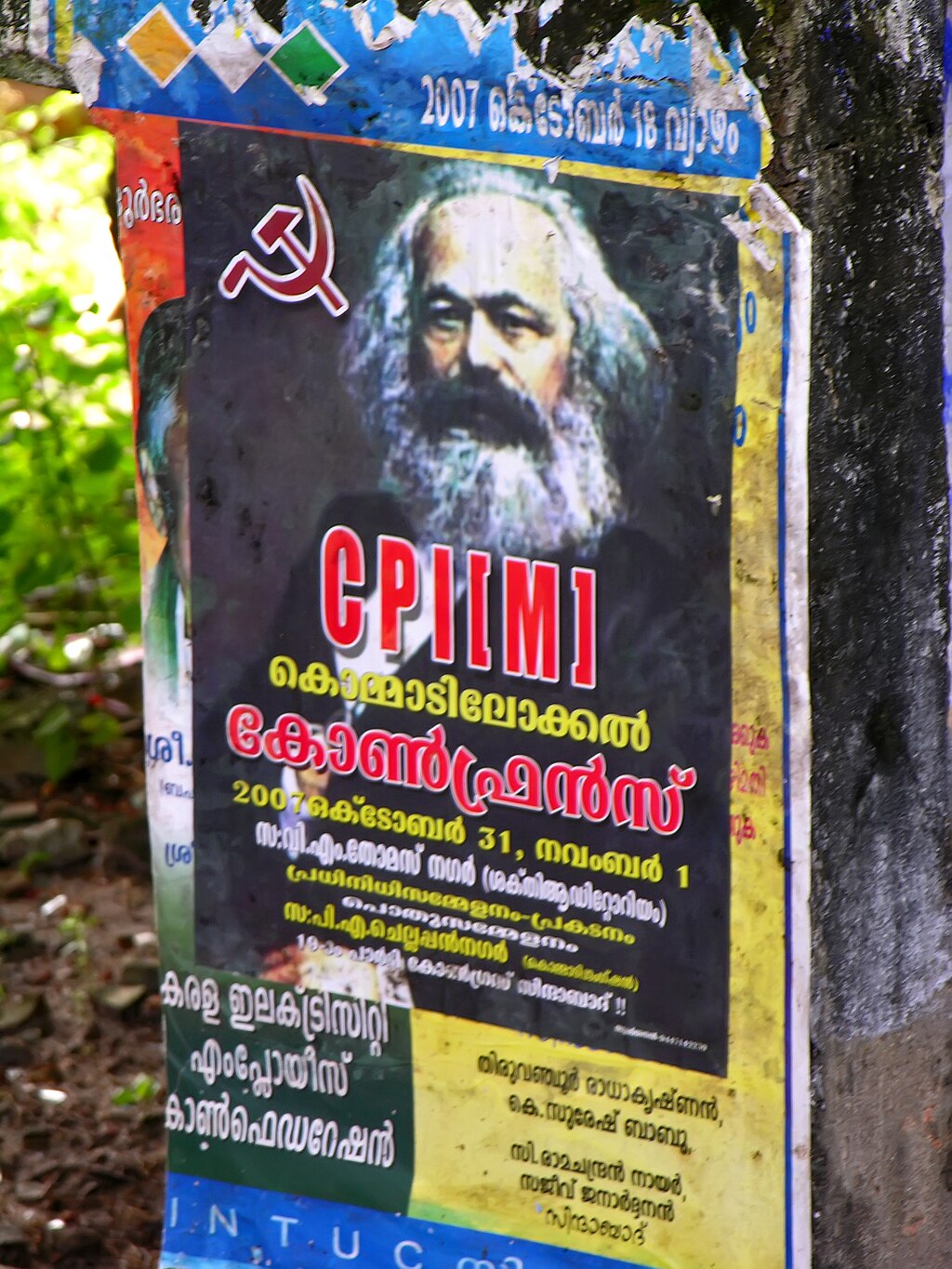 A CPI(M) poster in Kerala, India Marx supported the cause of Irish independence. In 1867, he wrote Engels: "I used to think the separation of Ireland from England impossible. I now think it inevitable. The English working class will never accomplish anything until it has got rid of Ireland. ... English reaction in England had its roots ... in the subjugation of Ireland."[262] Marx spent some time in French Algeria, which had been invaded and made a French colony in 1830, and had the opportunity to observe life in colonial North Africa. He wrote about the colonial justice system, in which "a form of torture has been used (and this happens 'regularly') to extract confessions from the Arabs; naturally it is done (like the English in India) by the 'police'; the judge is supposed to know nothing at all about it."[263] Marx was surprised by the arrogance of many European settlers in Algiers and wrote in a letter: when a European colonist dwells among the 'lesser breeds,' either as a settler or even on business, he generally regards himself as even more inviolable than handsome William I [a Prussian king]. Still, when it comes to bare-faced arrogance and presumptuousness vis-à-vis the 'lesser breeds,' the British and Dutch outdo the French.[263] According to the Stanford Encyclopedia of Philosophy: Marx's analysis of colonialism as a progressive force bringing modernization to a backward feudal society sounds like a transparent rationalization for foreign domination. His account of British domination, however, reflects the same ambivalence that he shows towards capitalism in Europe. In both cases, Marx recognizes the immense suffering brought about during the transition from feudal to bourgeois society while insisting that the transition is both necessary and ultimately progressive. He argues that the penetration of foreign commerce will cause a social revolution in India.[264] Marx discussed British colonial rule in India in the New York Herald Tribune in 1853: There cannot remain any doubt but that the misery inflicted by the British on Hindostan [India] is of an essentially different and infinitely more intensive kind than all Hindostan had to suffer before. England has broken down the entire framework of Indian society, without any symptoms of reconstitution yet appearing... [however], we must not forget that these idyllic village communities, inoffensive though they may appear, had always been the solid foundation of Oriental despotism, that they restrained the human mind within the smallest possible compass, making it the unresisting tool of superstition.[263][265] |
 インドのケーララ州にあるCPI(M)のポスター マルクスはアイルランド独立運動を支援した。1867年、彼はエンゲルスに宛てて「私はかつてアイルランドがイングランドから分離することは不可能だと考 えていた。しかし今では不可避だと考えている。イングランドの労働者階級はアイルランドを排除しない限り、決して何も達成できないだろう。... イングランドにおけるイングランド人の反応は、... アイルランドの従属にその根源がある」と書いている。[262] マルクスは、1830年に侵略されてフランス植民地となったフランス領アルジェリアにしばらく滞在し、北アフリカの植民地生活を観察する機会があった。彼 は、植民地の司法制度について書き、「アラブ人から自白を引き出すために、ある種の拷問が(定期的に)用いられている。当然ながら、それは(インドにおけ る英国人のように)『警察』によって行われる。裁判官は、それについてまったく知らないことになっている」と述べている。[263] マルクスはアルジェにやってきた多くのヨーロッパ人入植者の傲慢さに驚き、手紙にこう書いている。 ヨーロッパの植民者が「劣った人種」の間に住む場合、定住者として、あるいは仕事で滞在する場合でも、一般的に、彼はハンサムなウィリアム1世(プロイセ ン王)よりもさらに神聖な存在であるとみなしている。それでも、「劣った人種」に対するあからさまな傲慢さと思い上がりに関しては、イギリス人とオランダ 人はフランス人を凌駕している。 スタンフォード哲学百科事典によると、 マルクスによる植民地主義の分析は、後進的な封建社会に近代化をもたらす進歩的な力として描かれており、外国による支配を正当化する見え透いた理由付けの ように聞こえる。しかし、彼の英国による支配に関する説明は、ヨーロッパの資本主義に対する彼の見解と同じような両義性を反映している。いずれの場合も、 マルクスは封建社会からブルジョワ社会への移行の過程で生じた途方もない苦しみについて認識しているが、その移行は必要であり、最終的には進歩的であると 主張している。彼は、外国貿易の浸透がインドで社会革命を引き起こすだろうと主張している。[264] マルクスは1853年、ニューヨーク・ヘラルド・トリビューン紙で、インドにおける英国の植民地支配について論じている。 英国がインドに与えた苦しみは、それ以前にインドが経験した苦しみとは本質的に異なり、はるかに深刻なものであることに疑いの余地はない。英国はインド社 会の枠組み全体を崩壊させたが、再構築の兆候はまだ現れていない... [しかし、] これらの牧歌的な村落共同体は、一見害のないように見えるかもしれないが、常に東洋の専制政治の強固な基盤であり、人間の心を可能な限り狭い範囲に抑制 し、迷信の無抵抗な道具としていたことを忘れてはならない。[263][265] |
| https://en.wikipedia.org/wiki/Karl_Marx |
|
リ ンク
文 献
そ の他の情報
Copyleft,
CC, Mitzub'ixi Quq Chi'j, 1996-2099
Copyleft, CC, Mitzub'ixi Quq Chi'j, 1996-2099
☆
 ☆
☆